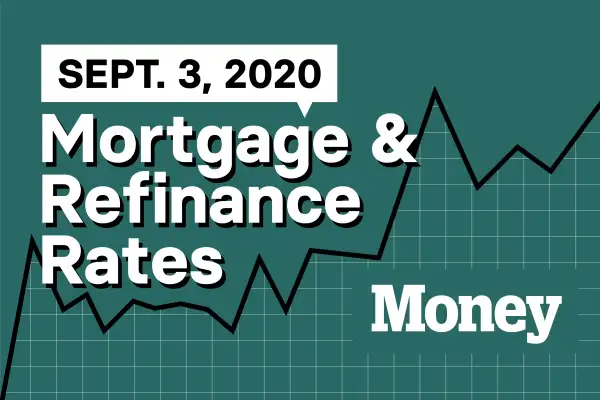Here Are Today's Best Mortgage & Refinance Rates for September 3, 2020

Borrowers with 700 credit scores were quoted an average rate of 3.364% to secure a 30-year fixed-rate purchase mortgage on Wednesday, according to Money's survey of over 8,000 lenders across the United States. At this credit score, roughly the national average, the average rate for a 30-year refinance was 4.192%. Our rates include discount points and are for borrowers putting 20% down.
| 30-year fixed-rate purchase mortgage |
| 3.364% |
| Rates of September 2, 2020 |
Borrowers in West Virginia were quoted the lowest mortgage rates on Wednesday—at a rate of 3.24%. Those in Nevada saw the highest average at 3.559%. Nationwide, borrowers with the highest credit scores, 740 and above, were quoted rates averaging 3.074%, while those with credit of 640 or below were given rates of 4.852%—a 1.778 percentage point spread.
You may be able to negotiate a lower rate if you shop around or if you have other accounts with the lender. Currently, some banks are hiking up advertised rates to keep demand in check, so you may be offered a lower rate if you reach out directly.
Freddie Mac’s widely quoted Primary Mortgage Market Survey put rates at 2.93% with 0.8 discount points paid for the week ending September 3. The mortgage purchaser’s weekly survey reflects borrowers who put 20% down on conforming loans and have excellent credit.
Refinance rates today
Money's survey shows that the best rate for a 30-year refinance for someone with a 740 credit score was 3.476% on Wednesday. Last September, the average mortgage rate (including fees) was 3.922%.
| 30-year fixed-rate mortgage refinance |
| 3.476% |
| Rates of September 2, 2020 |
A homeowner with a $200,000 mortgage balance currently paying 3.922% on a 30-year loan could potentially cut their monthly payment from $946 to $895 by financing at today’s lower rates. To determine if it is worth it to refinance your mortgage, also consider the closing fees you paid on your current mortgage, how much your new lender is charging and how long you have left on your current mortgage. (Our picks for the best lenders for refinancing are here.)
What else is happening in the housing market right now?
The news of today, that could impact your home tomorrow.
Homebuyer demand remains high, fueling a 10% rise in median listing prices and further depleting already tight housing inventory, according to Realtor.com's August Monthly Housing Trends Report.
Median home listing prices reached a new high of $350,000 thanks to high demand from buyers looking to not only take advantage of historically low interest rates but also expand into larger living spaces. As a result, the inventory of homes for sale was 36% lower this August than last. New listings coming onto the market were down 12% year-over-year, slightly better than the 13% decline in July. Overall, there are 500,000 fewer homes on the market compared to the same time last year.
"It's difficult to imagine that the housing market will be able to sustain the frenzied demand we are currently experiencing, but we have yet to see any signs of slowing," said Danielle Hale, chief economist for Realtor.com. "Buyer traffic on realtor.com is outpacing the record levels we saw earlier this year, suggesting that demand will continue to exceed the number of available homes for sale. Although demand is much more intense than it normally is this late into a buying season, the typical home asking price has likely peaked for the year at $350,000. However, given the strong demand, sellers will remain in the driver's seat for the foreseeable future."
Of the 50 largest metro areas covered by the report, 49 saw and 8.9% year-over-year gain in median listing price, with Philadelphia seeing the largest increase (19%), followed by Cincinnati (18%), Cleveland (16%), and Boston ((15%). The sole exception was the Miami metro area, where median listing prices ticked down 0.03%.
Mortgage tip of the week
Buying a home can be daunting. Follow these expert tips to make the process easier.
"Shop around for lenders," suggests Emanuel Santa-Donato, Senior Director Of Capital Markets at Better.com. "Don’t settle on the first rate, or even the first lender that you find. Make sure you look around to make sure you get the best interest rate out there."
Adding, "Trust yourself. Your real estate agent may recommend a specific agent but choosing a lender is a very important and personal decision. You know your budget and your preferred means of communication."
Bottom line:
5 Ways Your Finances Instantly Change When You Buy a House
When Will It Get Easier to Buy a Home? 8 Experts on the Nation's Housing Shortage

